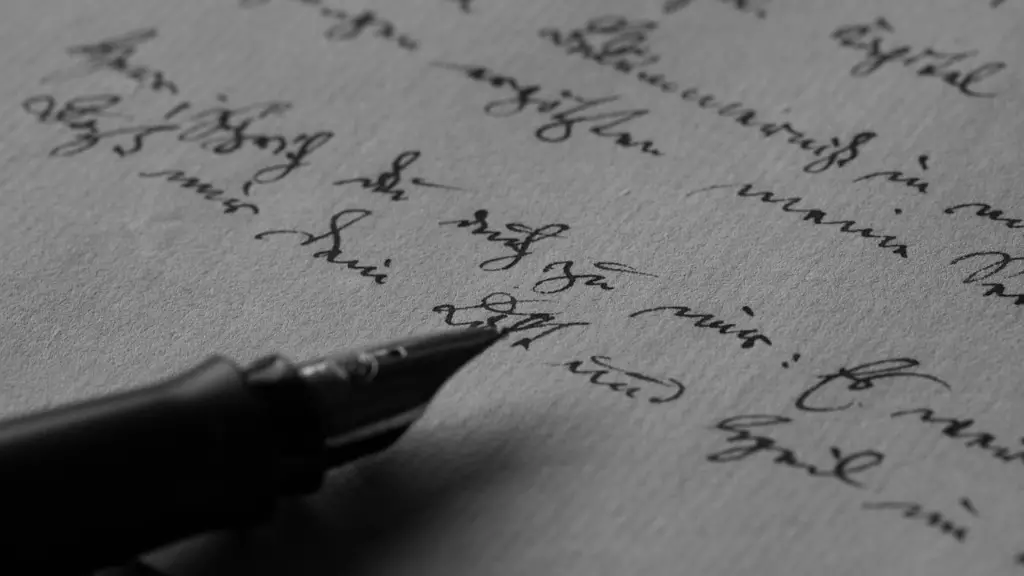Step 1: Develop an Idea for your Book
The first step in writing your own poetry book is to decide on an idea for your book. You should try to come up with a theme or overall message that your book will aim to convey. It could be something personal, like a story about a journey of self-discovery or a celebration of the wonders of nature. It could be a compilation of your favorite poems or a series of poems examining a particular subject or experience. Alternatively, you can use the theme of the book to explore a particular idea or concept. Once you have decided on your idea or theme, it is time to move on to the next step.
Step 2: Choose your Poems
Now that you have an idea for your book, it’s time to choose the poems you want to include. You can select new pieces you’ve written yourself, or use existing poems from the collection of your favorite poets. It’s important to choose poems that reflect your book’s idea or theme, as this will help to unify the book’s overall message. For instance, if your book’s theme is “the beauty of nature,” choose poems that capture the various aspects of nature that are important to you.
Step 3: Add Notes and Introduction
In order to make your readers fully understand your book and its concept, you should include an introduction or preface to the collection. This provides an opportunity to explain the idea behind your book and to introduce the reader to the concept. You can also use the introduction to explain the significance of the poems and why you wanted to share them with your readers.
It is also important to include notes to your poems. These notes can include explanations of words, phrases or ideas that might not be clear for those reading the poems for the first time. They can also provide the reader with helpful context about the poem and make the poem more meaningful.
Step 4: Begin Writing and Editing
Now that you have your idea and your poems, it’s time to begin the writing process. First, you need to decide on the structure of your book. This means determining the order in which you want the poems to appear, as well as the overall presentation of the collection. If you’re publishing your book in paper format, this also means deciding on paper size, font size and so on. Then, you need to start writing or editing your poems. Make sure to read through them multiple times, as this will help you to catch any errors or identify any areas in which you can improve the poem.
Step 5: Find a Publisher
Once your book is finished and edited, it’s time to find a publisher. You can find a publisher that specializes in poetry books, or you can go for a general publisher. Additionally, there are now many self-publishing options available that allow you to print your book directly from digital tools like Amazon Kindle. Whichever route you choose, it is important to research the publisher thoroughly in order to ensure that your book is in good hands.
Step 6: Market Your Book and Connect with Readers
If you want to get your book out there and make sure it’s seen by as many people as possible, you need to start marketing it. This means creating a marketing plan that includes strategies such as sending out press releases, setting up a website, social media marketing, and organizing readings and book signings. You should also join literary networks such as Goodreads and LinkedIn to connect with other poets and readers. This will help raise the visibility of your work and give you access to a larger audience.
Step 7: Nurture Your Craft and Grow as a Poet
Writing and publishing your own poetry book is an incredibly rewarding experience. However, it is important to keep writing and growing as a poet. Attend readings, join writing groups, and keep writing new pieces. This will help you to continue to develop your craft and to keep coming up with new ideas for future books.
How to Find Inspiration for Writing Poems
Inspiration is essential for any poet wishing to write a great poem. There are numerous ways to derive inspiration, but here are some of the most popular methods to get you started.
Observe Nature
One of the most commonly used sources of inspiration is nature. Experiencing nature can open our eyes to the beauty and variety of the world, and provide a source of ideas for your poetry. Take a walk out in the woods, to the beach, or simply sit and observe the sky – you may be surprised at the ideas that come to you.
Watch Movies and Read Books
Another source of inspiration is art. Watching films, television shows, and reading books can help spur ideas for your poetry. Find stories that you can relate to, and use them as inspiration for your own writing.
Listen to Music
Music can be a powerful source of inspiration. Listening to music can help open your mind to the possibilities of poetry. Find a piece of music that speaks to you, and useit as a starting point for your poem.
Free-Write
Sometimes the best way to find inspiration is to write with no particular end-goal in mind. Just start writing whatever is on your mind, and eventually ideas will start to form. This can be a great way to ease yourself into a poem, and generate ideas that you can use in other poems.
Talk to People
Talking to people can be an unexpected source of poetry ideas. Listening to people’s experiences and ideas can help to generate ideas that you can use in your own work. Ask family, friends, and strangers alike for their perspective as it can help you to find unique points of view for your writing.
Keep a Notebook
The best way to make sure that your ideas don’t get lost is to keep a notebook with you. Whenever an idea occurs to you, jot it down in the notebook. You can come back to your notes later and use them to generate a poem. It can also be helpful to carry around a notepad to ensure that you can rapidly jot down ideas as they come to you.
How to Edit Your Poetry
Once you have written your poem, it is time to start the editing process to ensure that your poem is at its best. Editing is an essential part of the process for any poet, and here are some key tips for editing your poems.
Get Feedback from Others
Getting feedback from others is possibly the most important step in editing. It can be helpful to get feedback from friends, family, or writing groups – allow yourself to take their advice and criticisms into account when editing your poem.
Proofread
Proofreading is essential for ensuring that your poem is free from spelling and grammatical mistakes. It is important to do multiple reads of your poem to catch any errors, as these can distract from the overall impact of your poem.
Revise the Structure
After you have proofread your poem, it is time to revisit the structure. Determine whether your poem flows well, and if not, make any adjustments to improve the flow. Read your poem out loud to determine where changes need to be made.
Rewrite
Sometimes you may find that your poem is missing something, or that certain lines need to be adjusted or rearranged. If this is the case, don’t be afraid to rewrite your poem. Take a step back from the poem and consider how it can be improved.
Walk Away
Finally, once you’re done editing, it is important to take a break and step away from the poem. This allows you to come back to your poem with fresh eyes, and gain perspective on how it can be improved.
How to Publish Your Poetry
Once you’re satisfied with your poem, it is time to start thinking about how you want to publish it. Here are some popular publication methods for poets.
Book Publishing
This is the traditional method of poetry publication. If you choose to publish your poems as part of a book, you will need to contact a publisher in order to get your work published.
Anthologies and Journals
Another popular method of publication is in anthologies or literary journals. Many publications will accept submissions of poetry, so it can be worth submitting your work to these publications to get it seen by a wider audience.
Internet Publications
The internet can also be a great tool for publishing your poems. There are numerous websites dedicated to the publication of poems, allowing you to present your work to a global audience.
Self-Publishing
Finally, you can always opt for the self-publishing route. There are numerous tools available, such as Amazon Kindle Direct Publishing, which allow you to publish your work to a global audience.





